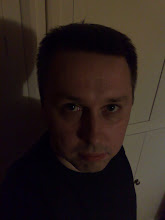 What initially strikes you about Flicker is, quite apart from its cultural prescience (and it was published in 1992) is its similarity thematically with Dan Brown's The Da Vinci Code. But while there are shadowy conspiracies, paranoia and Gnosticism, Flicker contains no car chases, cliff-hangers or narrow escapes.
What initially strikes you about Flicker is, quite apart from its cultural prescience (and it was published in 1992) is its similarity thematically with Dan Brown's The Da Vinci Code. But while there are shadowy conspiracies, paranoia and Gnosticism, Flicker contains no car chases, cliff-hangers or narrow escapes. Roszak at the time was better known for his sociology texts and for allegedly coining the term 'counterculture'; subsequently Flicker is a slow-burn - literary, analytical, comtemplative and a deeply, deeply seductive piece of writing.
Beginning in the 50's, Jonathan Gates, a young film scholar gradually discovers that the works of an all-but forgotten German film-maker, Max Castle are a window to an ancient hidden conspiracy, the ongoing work of Cathar religious heretics.
Gates finds himself under the tutelage of the older, analytical Clare Swann, a woman running a mildewed art-house cinema in L.A. and who likes to use film criticism as a sex aid. A "frenzied cerebral-genital curriculum". Together they unearth more of the mystery of the enigmatic Castle. To avoid the Nazi's Castle fled to Hollywood and found himself knocking out low grade horror and exploitation fare. After Castle was lost at sea near the end of the war, Castle's movies slid into obscurity. When they discover one of the 'lost' Castle movies, Gates slowly starts to realise there is more to his movies than meets the eye - literally. There are movies within his movies, something hidden within the 'flicker'...
There was in Castle’s films a genuine horror, one that froze through to the bone. At no point could I have said precisely where the film’s power lay—except that I was sure it was nothing I’d consciously seen that produced the effect. Rather, it was as if somewhere behind my eyes, another part of me was observing a different world, one in which the vampire and his victim were real, the supernatural events were real, the blasphemy was real.
Of course the subject of subliminal imagery has cropped up in many movies over the years: the skull over laying Anthony Perkins face in Psycho, the devils head in The Exorcist, and of course any amount of subliminal messages lurking behind modern day advertising. But that's a whole other conspiracy for another day.
Over the course of 600+ pages, Roszak very deliberately builds up a grandiose conspracy involving Gnostic dualists, Catholic persecution and an impending apocalypse that manages to convince purely because he's taken his sweet time about building up a rich fantasia of characters and places. There's a deep abiding love for cinema too, directors, actors, Hollywood trivia and an almost masturbatory detail for media theory. Orson Welles makes a cameo after it's established that Castle was on set for Citizen Kane, and was responsible for many of the innovations in the movie; indeed there's a wonderful overlap of fiction and actual movie fact in Flicker that you constantly find yourself wanting to rush to Wikipedia in order to tease apart the two in more obscure refrerences.
The subliminal 'movies within movies' is a seductive idea too; aside from the more well-known examples as noted earlier, it makes you wish for a real life equivalent of Castle's movies. Readers of the novel will know each other by the quickening of their pulse at the mention of a 'sallyrand', and I'll say no more.
Alas in the final 200 pages or so of the book, Roszak loses focus to an extent as he turns his attention from classic film appreciation to modern day movie making. The conspiracy takes centre stage and the characters slip out of focus somewhat. And for all Roszak's clear and abiding love of the golden age of cinema, his view of more modern fare makes him sound like an old curmudgeon. The ending too, while admittedly quite peverse, is something of a let-down after the comtemplative and academic stance of much of the novel. It feels like the denoument of a completely different, slightly more sensationalistic book.
That aside I can say that I did adore the book. It's rich, funny, beautifully written and filled to the brim with ideas. And books like that don't come along all that often.
Apparently Darren Aronofsky and Fight Club screenwriter JimUhls were connected with the book for a while, but it appears to have slipped through the cracks for the time being. Although Flicker would be a tough call for most directors, I can easily imagine Aronofsky getting to grips with the book's complexities and playing with the idea of Castle's subliminal movies within movies. Maybe one day.
Next up is Michael Chabon's Gentlemen of the Road...
 Mark it in your diaries: September 4th. The best US sitcom since Frasier is finally coming to the UK (albeit four seasons behind). After repeating Friends until I can just about quote every line of all ten seasons, E4 have finally bought How I Met Your Mother. BBC bought the first season a few years ago and killed it stone dead by showing it at 3 in the morning, and I only in the past year or so rediscovered it.
Mark it in your diaries: September 4th. The best US sitcom since Frasier is finally coming to the UK (albeit four seasons behind). After repeating Friends until I can just about quote every line of all ten seasons, E4 have finally bought How I Met Your Mother. BBC bought the first season a few years ago and killed it stone dead by showing it at 3 in the morning, and I only in the past year or so rediscovered it.
_04.jpg)






















